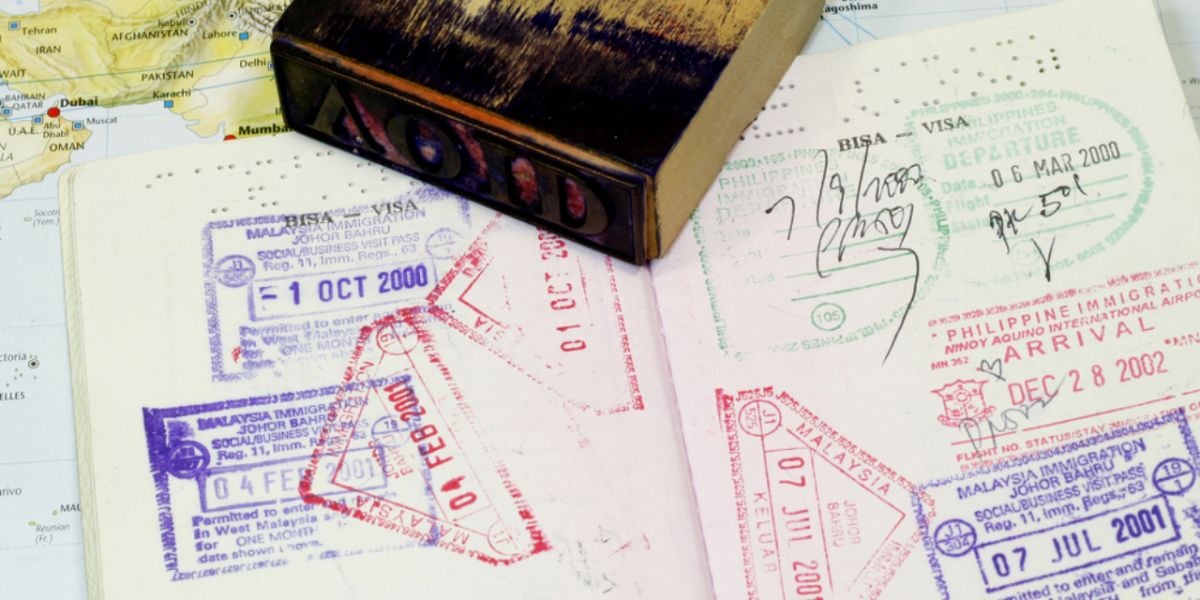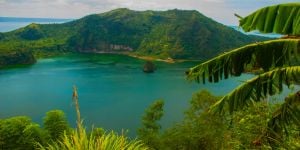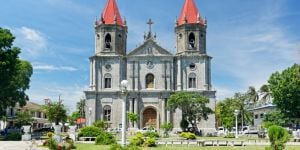
If you're a foreign national intending to move to the Philippines, you can choose among different types of visas according to your particular requirements. Find out in this article which type of visa is appropriate for you.

Types of visas for the Philippines
Below are the different categories and types of visas available for the Philippines:
Immigrant visas
The following visas are intended for foreign nationals who wish to attain permanent residency in the Philippines:
- Quota immigrant visa
- Non-Quota immigrant visas
Non-Immigrant visas
The following visas are intended for temporary stays in the Philippines:
- Visitor visa
- Accredited officials of foreign governments
- Student visa
- Pre-arranged work visa 9 (G)
Marriage visa
The 13a marriage visa allows foreign spouses of Filipino Nationals to live permanently in the Philippines. The main requirements for the 13a visa are:
- A partner who is a Philippine citizen
- A valid marriage certificate recognized by the Philippines.
Special visas
The following visas are intended for retirees, investors and entrepreneurs in the Philippines:
- Special Investor's Resident Visa (SIRV)
- Special Visa for Employment Generation (SVEG)
- Special Resident Retiree's Visa (SRRV)
- Special Non-Immigrant Visa (SNIV)
- Special Employment Visa for Offshore Banking Unit (SEVOBU)
Quota and non-quota immigrant visas in the Philippines
Quota immigrant visa
This visa is intended for nationals of countries that grant Filipinos the same immigration privileges and permanent residency status. Note that only a maximum of 50 visas of any one nationality per year are granted under this category. You should also demonstrate that you possess the qualifications and skills that would benefit the national interest of the Philippines or that you have sufficient capital to make a sustainable investment, including but not limited to the following:
- inward remittance of at least US$ 50,000
- Ownership of a condominium
- Investment in an existing corporation
The quota immigrant visa holder has the right to do business in the Philippines (in the sectors permitted under the laws of the Philippines) without needing to obtain an Alien Employment Permit (AEP). Upon exiting the country, the quota visa holder is automatically granted a re-entry permit.
After you have submitted all the required documents and paid the required fees, you will attend a hearing. You can check the immigration website accordingly for the status.
Non-quota immigrant visas
To fit into the non-quota category (those admitted without regard to numerical limitations), you must either be:
- a child born to foreign parents during their temporary stay in the country or born of an immigrant;
- the wife or the husband or the unmarried child under 21 years old of a Philippine citizen;
- a Filipino national returning to their home country; or
- someone who has been granted permanent residence and is returning to the Philippines after a temporary visit abroad.
In general, the documents required include the following but are not limited to:
- letter request addressed to the Commissioner according to the situation;
- two duly accomplished CGAF forms (Consolidated General Application Form for Immigrant Visa);
- original and photocopy of your passport (which should be valid for at least six months following your trip to the Philippines);
- Bureau of Immigration Clearance Certificate; and
- original or certified true copy of Bureau of Quarantine Medical
- Clearance for nationals of certain countries.
Depending on the type of visa you're applying for, you might also need to present:
- proof of cohabitation;
- NBI Clearance;
- applicant's and parents' birth certificates;
- proof of re-entry to the Philippines;
- proof of financial capacity; or
- documentary requirements for each dependent.
You will find the detailed checklist on the website of the Philippine Bureau of Immigration (BI).
Non-immigrant visas for the Philippines
Visitor visa
This visa is for temporary visitors coming for business, for holidays, for health reasons or for short-term study. Numerous countries are visa exempt for stays of up to 30 days. For those intending to stay over the visa-exempt duration or those who are not nationals of the visa-exempt countries, you must apply for a temporary visitor's visa and prepare the minimum requirements:
- Original and photocopy of your passport (which should be valid for at least six months following your trip to the Philippines);
- duly accomplished visa application forms;
- two passport photos;
Proof of vaccination against COVID-19
- Register and complete the eTravel Portal (replacing the former One Health Pass). This can be done within 72h before arrival or upon arrival at the latest.
- Proof of bona fide status as a tourist or businessman
- confirmed tickets for return or onward journey to the next port of destination.
Visa for Accredited Officials of Foreign Governments
If you are an accredited official of a foreign government recognized by the government of the Philippines, you, your family, or your employees can apply for this visa. You must complete the following:
- endorsement from the Department of Foreign Affairs (DFA);
- Original and photocopy of your passport (which should be valid for at least six months following your trip to the Philippines);
- photocopy of the birth certificate of your dependent(s); and
- latest visa issued by the DFA (if any).
Student visa
You can apply for a student visa if you're at least 18 years old, have sufficient financial resources, and intend to take up a course higher than high school at a school accredited by the BI.
Students must directly enrol with the Philippine University or Higher Education Institution they have chosen, which will then submit the application to the Commission on Higher Education (CHED) for approval. If the answer is positive, the CHED will transmit its approval to the Secretary of Foreign Affairs, who will then allow the Consulate to issue the student visa.
Documents to be produced as listed by the BI:
- Letter request addressed to the Commissioner from the representative of the petitioning school;
- Duly accomplished CGAF (Consolidated Geral Application for Immigrant Visa ) forms. If the applicant is a minor, it shall be signed by the parent or the legal guardian;
- Photocopy of passport bio-page and latest admission with valid authorized stay;
- Certificate of Acceptance issued by the learning institution accredited by the Bureau of Immigration to accept foreign students, indicating the number of months (length of study) of the technical/vocational, special and/or primary or secondary level courses for applicants below 18 years of age;
- Photocopy of BI school accreditation ID of the registrar or school representative;
- National Bureau of Investigation (NBI) Clearance, in case of flying schools;
- BI Clearance Certificate.
- Bureau of Immigration Clearance Certificate.
Pre-arranged work visa
Two further subtypes for this visa exist:
- Commercial, also known as the 9 (G) visa - intended for foreigners engaged in any lawful occupation, whether for wages, salary, or other forms of compensation.
- Non-commercial - intended for foreigners engaged in missionary, social, rehabilitation, or medical mission.
To be eligible for this visa, you must obtain an *Alien Employment Permit (AEP). First, your employer must make a petition, under oath, to the Department of Labor and Employment (DOLE) for contracting the services of a foreign employee. When DOLE's requirements are met, it endorses the matter to BI so you can enter the country and be issued with the AEP. The BI Commissioner then transmits his approval to DFA Manila, who will authorize the Philippine consulate in your country of residence to issue the visa. You must appear personally at the Philippine embassy or consulate in your home country and submit the following as listed in this checklist (commercial) from the BI website.
- joint letter request addressed to the Commissioner from you and your employer;
- Original and photocopy of your passport (which should be valid for at least six months following your trip to the Philippines);
- two duly accomplished CGAF for Non-Immigrant Visa;
- photocopy of an employment contract or certificate of appointment/assignment;
- photocopy of employer's Income Tax Return (ITR) with proof of payment;
- documents of incorporation for corporations or business permit for sole proprietorships;
- photocopy of AEP;
- notarized certification of the number of foreign and Filipino employees from the employer;
- special temporary permit for an applicant practising a regulated profession under the Professional Regulation Commission (PRC) (if applicable);
- Bureau of Immigration Clearance Certificate;
- original or certified true copy of Bureau of Quarantine Medical Clearance for nationals of certain countries.
For 9 (G) non-commercial visas which have a validity of 1-3 years and can be extended for up to three years per time, resting on the term of the employment contract, the foreign national can also extend this visa multiple times. The validity, however, cannot surpass the term granted following the AEP issued by the DOLE. For the current non-commercial checklist please contact the Philippine Embassy or Consulate in your Home Country or assistance can be attained from your missionary, social, rehabilitation, or medical mission liaison.
Alien Employment Permit (AEP)
This permit authorizes a foreign national to work in the Philippines. You can either apply for this permit yourself at the Philippine embassy or consulate in your home country or request your employer to arrange for it with one of the regional offices of the DOLE.
Alien Certificate of Registration card (ACR I-Card)
An ACR I-card is a microchip ID card containing all the necessary information for immigration officials. All foreign nationals under immigrant and non-immigrant status who will stay for more than 59 days in the Philippines are required to apply for this card.
Special visas for the Philippines
Special Investor's Resident Visa (SIRV)
The SIRV allows you to live in the Philippines for an indefinite period as an investor as long as your investment subsists. You are eligible for this visa if you are at least 21 years old, you have never been convicted for any physical or moral offense, you are not suffering from any contagious or dangerous disease, you have never been interned for behavioral or mental disability, and you are willing or able to invest an amount of at least US$ 75,000 in the Philippines.
The documents required are:
- Original and photocopy of your passport (which should be valid for at least six months following your trip to the Philippines);
- a duly filled, signed and notarized visa application form, including recent passport-size identity photographs;
- a criminal record certificate (duly authenticated by the Philippine embassy);
- A medical certificate issued by the Department of Health (DOH) or any Philippines hospital or healthcare center (It can be an approved and accredited hospital, a medical center, a laboratory, or the equivalent in your home country, and must certify that you are physically and mentally fit. This certificate must have been issued not more than 6 months following the application date.);
- A sworn certification of authorized officers of the accredited custodian bank where you have deposited the amount of foreign currency stated and its conversion into pesos (in case it has been deposited in a non-accredited bank, the total amount of money should be transferred immediately to an accredited bank. But in all cases, the funds should not be transferred within one year before application.);
- A certified copy of the Philippines pesos deposit certificate with a maturity period of at least 30 days. (The original certificate will be kept with the custodian bank as a guarantee.);
- a birth certificate or family booklet authenticated by the Philippine consulate (If the spouse and dependent children are included in the application, you also require a marriage certificate authenticated by the Philippine consulate.).
Special Visa for Employment Generation (SVEG)
This visa applies to a qualified non-immigrant foreigner who shall actually employ at least ten Filipinos in a lawful and sustainable enterprise, trade, or industry. Documents to be produced as listed by the BI:
- letter request addressed to the commissioner;
- two duly accomplished CGAFs;
- Original and photocopy of your passport (which should be valid for at least six months following your trip to the Philippines);
- documents of incorporation for corporations or business permit for sole proprietorships;
- photocopy of AEP;
- DOLE certification of regular employment of at least 10 Filipinos;
- valid medical certificate from the BOQ;
- sworn statements certifying salary and contribution information on the employees;
- NBI Clearance, if the application is filed six months or more from the date of the first arrival in the country; and
- Bureau of Immigration Clearance Certificate.
Special Resident Retiree's Visa (SRRV)
The SRRV is issued by the BI as part of the Philippine Retirement Program under the aegis of the Philippines Retirement Authority (PRA) to foreigners and overseas Filipinos. The visa allows you to reside permanently in the Philippines and also to leave the country anytime you want.
You are eligible for this visa if:
- With a pension - you are at least 50 years old, you can deposit US$ 10,000 in a Philippine bank account and receive a monthly pension of US$ 800 if you are alone and US$ 1,000 in the case of retired couples.
- Without a pension - you must be able to deposit US$ 50,000 if you are between 35 to 49 years old and US$ 20,000 if you are at least 50 years old. In the case of former Filipino citizens, they must be at least 35 years old, with or without dependents, and be able to deposit US$ 1,500. Foreign ambassadors and international staff having served in the Philippines and who wish to retire in the country (including those of the Asian Development Bank) must be at least 50 years old and be able to deposit US$ 1,500.
- resident retiree - you are not required to make additional deposits for your spouse and an unmarried child less than 21 years old. If your spouse is not joining, you can be accompanied by two unmarried children less than 21 years old. In the case of additional children meeting the same qualifications, you will have to deposit an amount of US$ 15,000 per child. However, this does not apply to former Filipino citizens.
In general, to apply for the special resident retiree visa in the Philippines, the following documents are to be produced:
- a duly filled and signed visa application form obtained from the Philippine Retirement Authority;
- a valid passport;
- a Form No. 11 inherent to the medical examination performed by an accredited physician and authenticated by the Philippine embassy or consulate (It should also indicate the applicant's serology, and if the examination is conducted in the Philippines, an RSCC form 2 will be required.);
- Proof of deposit of funds issued by a certified bank
- 6 passport-size identity photos (2.4 x 5 cm);
- a marriage certificate (authenticated by the Philippine embassy or consulate where the marriage was conducted); and
- children's birth certificate (authenticated by the Philippine embassy or consulate if they were born abroad).
Special Non-Immigrant Visa (SNIV)
This applies to foreign personnel or executives of regional or area headquarters and regional operating headquarters or multinational companies. You should have the following:
- letter request addressed to the Commissioner for the grant of the visa by a responsible officer of the company;
- two duly accomplished CGAFs;
- Original and photocopy of your passport (which should be valid for at least six months following your trip to the Philippines);
- Certification by a responsible officer of the company that the visa is intended for an executive who will work exclusively for the company's headquarters and will receive a salary of at least US$ 12,000 per annum;
- CV of the applicant;
- SEC Certificate of Registration and General Information Sheet of the current year;
- Bureau of Immigration Clearance Certificate;
- original or certified true copy of Bureau of Quarantine Medical Clearance for nationals of certain countries.
Special Employment Visa for Offshore Banking Unit (SEVOBU)
This visa applies to foreign nationals who are assigned by any foreign bank to work in its offshore banking unit in the Philippines. To obtain this visa, you should have the following:
- letter request addressed to the Commissioner for the grant of the visa by a responsible officer of the company;
- two duly accomplished CGAFs;
- Original and photocopy of your passport (which should be valid for at least six months following your trip to the Philippines);
- certification by a responsible officer of the company that the visa is for an employee of a foreign bank who will work exclusively for the OBU and that the applicant will withhold and remit the taxes due on all his income;
- SEC Certificate of Registration and General Information Sheet of the current year;
- Bureau of Immigration Clearance Certificate; and
- original or certified true copy of Bureau of Quarantine Medical Clearance for nationals of certain countries.
Useful links:
Ministry of Foreign Affairs - Visas
Philippine Department of Labor and Employment
We do our best to provide accurate and up to date information. However, if you have noticed any inaccuracies in this article, please let us know in the comments section below.








